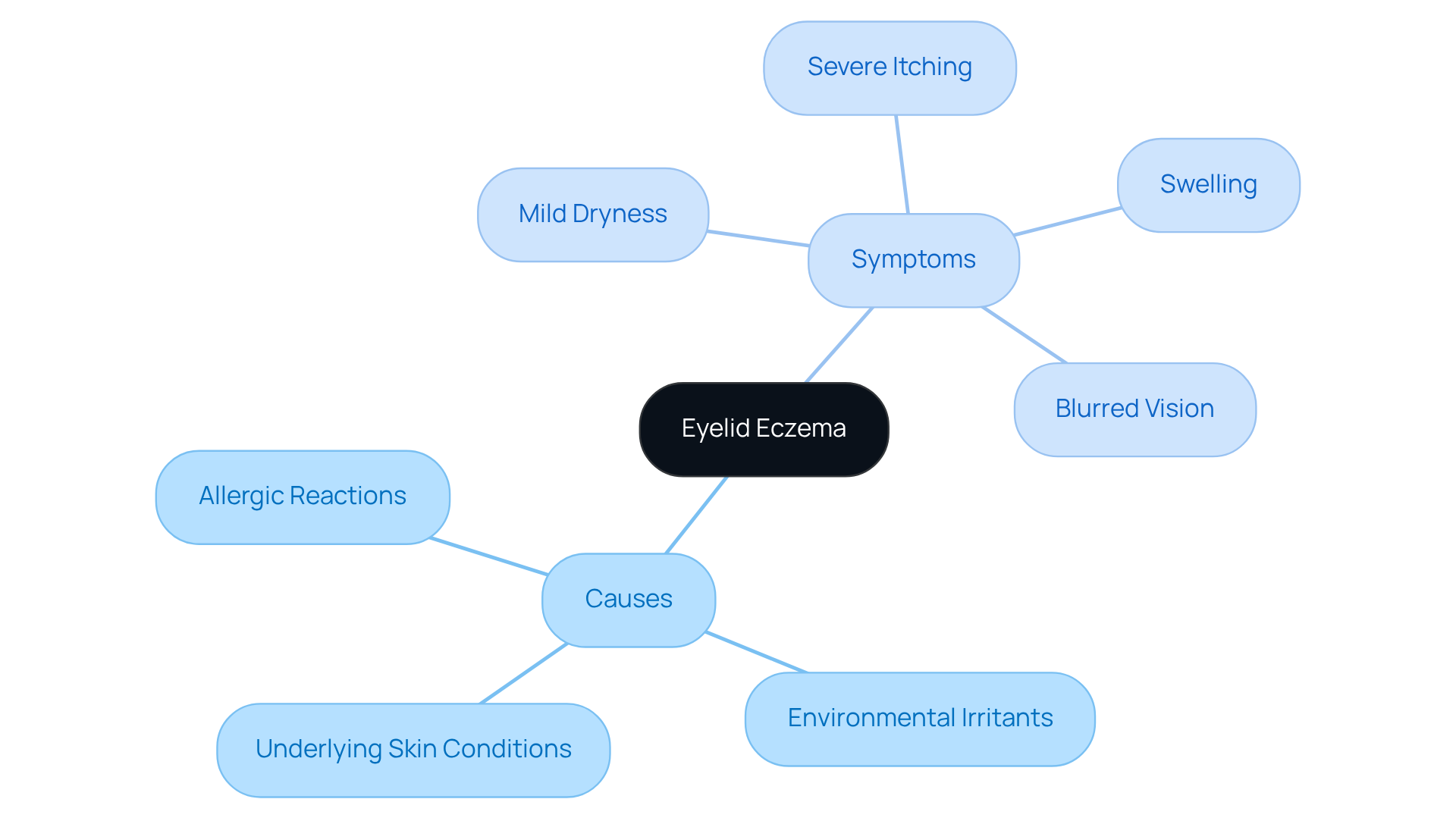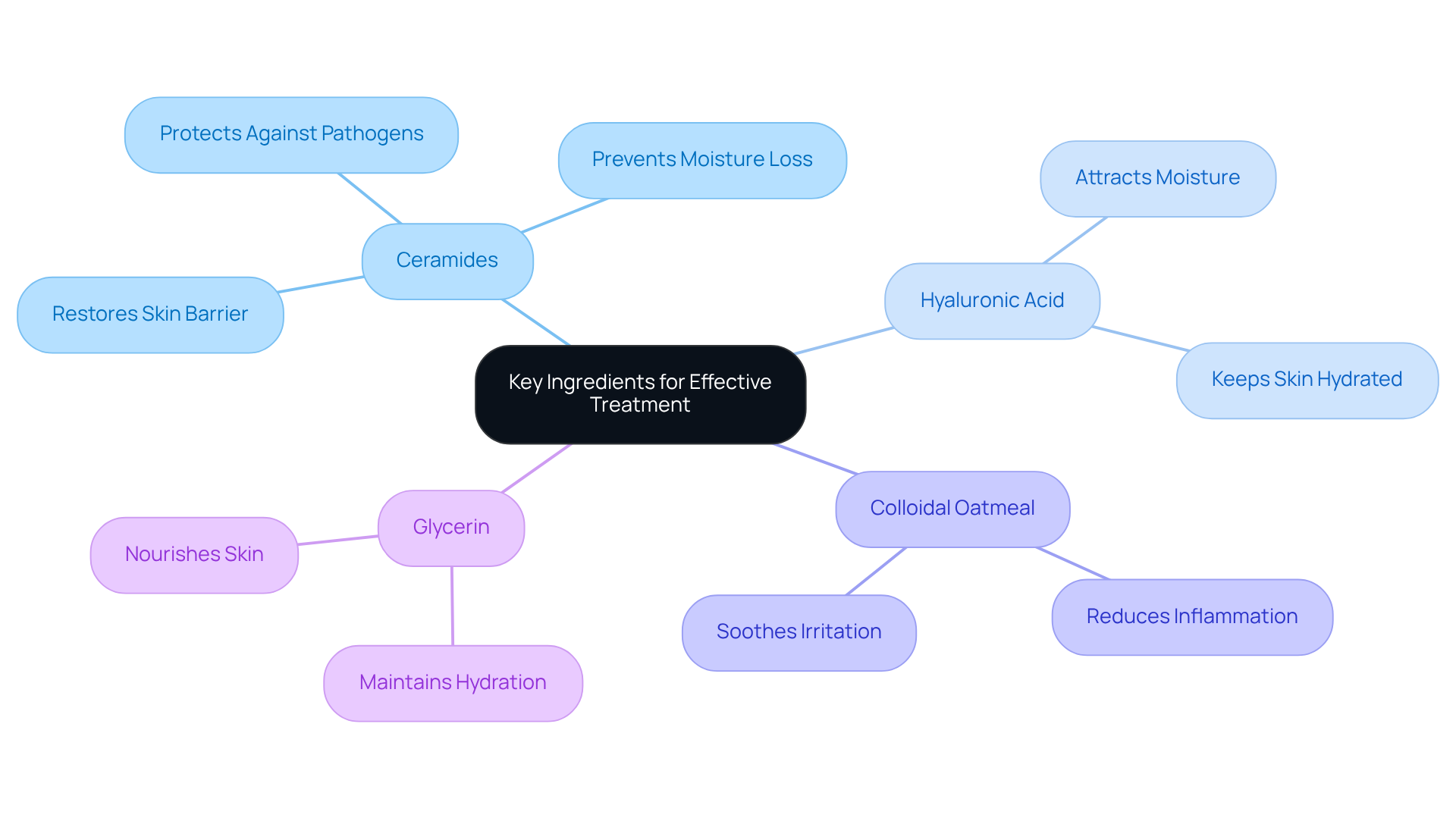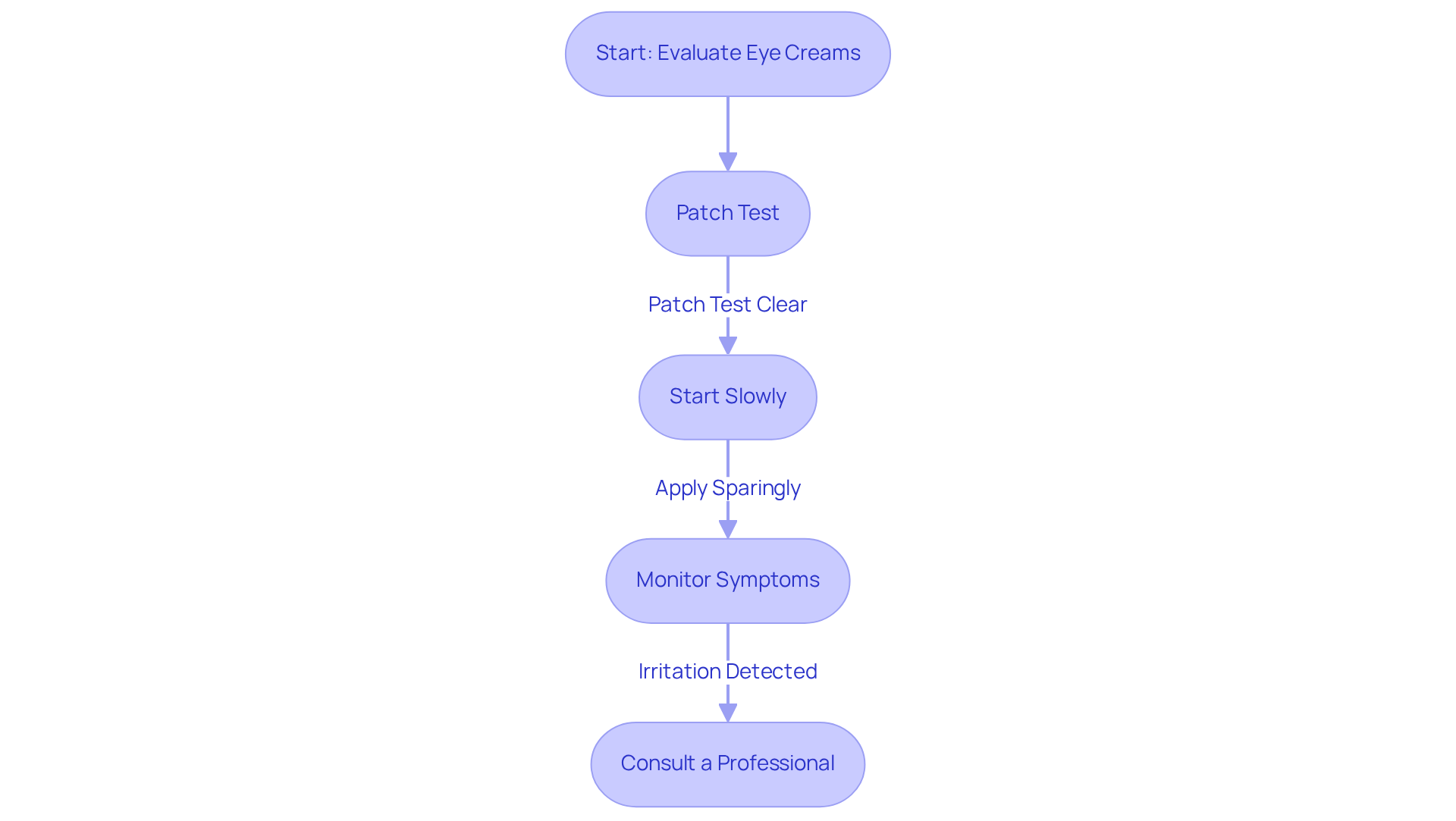Posted by: Northwest Eye in General on July 18, 2025
Overview
Choosing the best eye cream for eczema on your eyelids can feel overwhelming, but we’re here to help you through this process. It’s important to consider key ingredients like:
- Ceramides
- Hyaluronic acid
- Colloidal oatmeal
These ingredients work to hydrate and protect your skin barrier. We understand that patch testing new products is crucial; monitoring for any irritation can make a significant difference. Effective management of eyelid eczema requires a careful approach tailored to your unique skin responses. Remember, you are not alone in this journey, and taking these steps can lead to better skin health.
Introduction
Eyelid eczema is a condition that affects millions of individuals, often leading to discomfort and distress. The telltale symptoms—redness, swelling, and itching—can be quite challenging to manage. We understand that selecting the right eye cream is crucial for addressing this sensitive skin issue, as the wrong product can unfortunately exacerbate the problem.
With countless options available, it’s common to feel overwhelmed. How can one determine which eye cream truly offers relief and protection? This guide is here to navigate the essential steps in identifying the best eye cream for eczema on eyelids, ensuring that you can make informed choices that prioritize both comfort and effectiveness.
Understand Eyelid Eczema: Causes and Symptoms
Eyelid dermatitis, often referred to as eyelid inflammation, can manifest as red, itchy, and swollen areas around your eyes. We understand that experiencing this condition can be uncomfortable and concerning. Common causes include:
- Allergic reactions to cosmetics
- Environmental irritants
- Underlying skin conditions like atopic dermatitis
Symptoms may range from mild dryness to severe itching and swelling, which can significantly impact your comfort and appearance.
It’s essential to identify these signs early to choose the best eye cream for eczema on eyelids that effectively addresses both the skin condition and any related discomfort. We know that can sometimes accompany eyelid dermatitis, signaling potential underlying eye issues. If you notice persistent symptoms, we encourage you to consult a healthcare professional for a proper diagnosis and treatment plan. Only a Northwest Eye doctor or eye care professional can provide you with an accurate assessment.
Recent studies indicate that this skin condition affects approximately 31.6 million individuals in the United States, highlighting its prevalence and the importance of effective management strategies. Dermatologists emphasize that a personalized approach to treatment is crucial, as each individual’s skin may respond differently to various products and therapies.
At Northwest Eye, we are here to offer patient-focused care and a comprehensive array of services to address different eye conditions, including eyelid irritation. Our dedicated team is committed to helping you find effective solutions tailored to your unique needs. Remember, you are not alone in this journey, and we are here to help you through the process.

Identify Key Ingredients for Effective Treatment
When choosing the , it’s important to consider ingredients that not only hydrate but also protect your skin barrier. We understand that managing eczema can be challenging, and finding the right product can make a difference. Here are some effective ingredients to look for:
- Ceramides: These help restore your skin barrier and retain moisture, providing essential support.
- Hyaluronic Acid: Known as a potent humectant, it attracts moisture into the epidermis, keeping your skin hydrated.
- Colloidal Oatmeal: With its soothing properties, it can help reduce inflammation and irritation, bringing you comfort.
- Glycerin: This humectant works to maintain hydration in the dermis, ensuring your skin feels nourished.
It’s also wise to avoid products with fragrances, alcohol, or harsh chemicals, as these can exacerbate your symptoms. Remember, we are here to help you through this process, and finding the best eye cream for eczema on eyelids can lead to relief.

Evaluate and Test Eye Creams: A Practical Approach
To effectively evaluate and test the , especially since eyelid dermatitis affects the extremely thin and sensitive skin around your eyes, we understand that it’s important to approach this carefully. Here are some essential steps to guide you:
- Patch Test: We recommend starting by applying a small amount of the lotion on a less sensitive part of your body, like the inner arm. After 24 hours, check for any adverse reactions. This step can help identify potential irritants before applying to the delicate eyelid area.
- Start Slowly: Once your patch test is clear, apply the cream to your eyelids sparingly. Begin with once daily to observe how your complexion responds, allowing time for adjustment to the new product.
- Monitor Symptoms: It’s common to feel concerned about changes in your skin condition. Keep a close watch for any signs of irritation, such as redness, dryness, or itching. If you experience any irritation, please discontinue use immediately to avoid further discomfort. As Raj Chovatiya, MD, PhD, MSCI, notes, “While there is no remedy for the skin condition around the eyes, appropriate treatment with eye creams and emollients can assist in managing symptoms.”
- Consult a Professional: If you encounter persistent irritation or if your skin condition worsens, it’s crucial to consult a dermatologist or ophthalmologist. They can provide tailored advice and recommend suitable treatments based on your specific skin needs. Please be cautious with cortisone use around the eye area, as it may lead to glaucoma or cataracts.
By following these steps and considering components like chamomile oil and colloidal oatmeal, you can make informed choices about the best eye cream for eczema on eyelids that may be helpful. Remember, we are here to help you through this process.

Troubleshoot Common Issues with Eye Creams
If you encounter issues while using eye creams, we understand how concerning this can be. Here are some helpful troubleshooting tips:
- Irritation or Redness: Experiencing irritation, redness, or soreness can be distressing. This may be due to allergies, conjunctivitis, or dry eye disease. If you notice these symptoms, we recommend stopping the use of the product and consulting a healthcare professional. It’s important to remember that some ingredients may not be suitable for everyone.
- No Improvement: It’s common to feel frustrated if your symptoms do not improve after a few weeks. This might be a good time to reassess your choice of lotion or consult a dermatologist for alternative treatments. Untreated symptoms can lead to serious health complications, so is crucial for your well-being.
- Dryness: If the cream feels too heavy or causes dryness, consider switching to a lighter formulation or one specifically designed for sensitive skin. Your comfort is important, and there are options available that may better suit your needs.
- Allergic Reactions: If you notice swelling or severe itching, please discontinue use immediately and seek medical advice. These could be signs of an allergic reaction or other underlying conditions. Understanding these common issues can empower you to make informed decisions about your skincare routine, particularly when searching for the best eye cream for eczema on eyelids. Remember, we are here to help you through this process.

Conclusion
Eyelid eczema can indeed pose challenges, but selecting the right eye cream can significantly alleviate discomfort and promote healing. We understand that navigating this condition can be overwhelming, and recognizing the causes, symptoms, and the importance of choosing products with effective ingredients is crucial in managing this skin issue. By taking a thoughtful approach to product selection and application, you can find relief and restore the health of your delicate eyelid skin.
Key insights from this guide emphasize the importance of identifying the right ingredients, such as:
- Ceramides
- Hyaluronic acid
These ingredients not only hydrate but also protect the skin barrier. Additionally, practical steps for evaluating and testing eye creams—such as patch testing and monitoring symptoms—are essential in ensuring a safe and effective skincare routine. It’s common to encounter issues like irritation or a lack of improvement, but troubleshooting these concerns empowers you to make informed decisions and seek professional advice when necessary.
Ultimately, addressing eyelid eczema requires a personalized approach. Understanding the nuances of effective treatment can lead to significant improvements in your quality of life. By prioritizing skin health and seeking tailored solutions, you can confidently navigate your journey toward healthier eyelids. Taking proactive steps today can pave the way for a more comfortable tomorrow, underscoring the importance of informed choices in skincare.
Frequently Asked Questions
What is eyelid eczema, and what are its common symptoms?
Eyelid eczema, or eyelid dermatitis, is characterized by red, itchy, and swollen areas around the eyes. Symptoms can range from mild dryness to severe itching and swelling, which can affect comfort and appearance.
What are the common causes of eyelid eczema?
Common causes include allergic reactions to cosmetics, environmental irritants, and underlying skin conditions like atopic dermatitis.
Can eyelid eczema cause any additional symptoms?
Yes, blurred vision can sometimes accompany eyelid dermatitis, which may indicate potential underlying eye issues.
How prevalent is eyelid eczema in the United States?
Recent studies indicate that approximately 31.6 million individuals in the United States are affected by this skin condition.
Why is it important to consult a healthcare professional for eyelid eczema?
Consulting a healthcare professional is essential for a proper diagnosis and treatment plan, as only an eye care professional can provide an accurate assessment.
What is the recommended approach to treating eyelid eczema?
Dermatologists emphasize that a personalized approach to treatment is crucial, as each individual’s skin may respond differently to various products and therapies.
What services does Northwest Eye offer for individuals with eyelid eczema?
Northwest Eye provides patient-focused care and a comprehensive array of services to address different eye conditions, including eyelid irritation, with a commitment to finding effective solutions tailored to individual needs.






